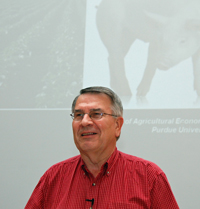 “Hog Economics in the Biofuels Era” was the topic of a presentation by Purdue University economist Dr. Chris Hurt at the Boehringer Ingelheim Vetmedica Swine Health Seminar in North Carolina.
“Hog Economics in the Biofuels Era” was the topic of a presentation by Purdue University economist Dr. Chris Hurt at the Boehringer Ingelheim Vetmedica Swine Health Seminar in North Carolina.
Dr. Hurt says government policies like biofuels and even food stamps were built upon a “psychology of surplus” to increase prices. “We continue to see a psychology of surplus in our policy from Washington, when it turns out we are in a period of shortage of basic food ingredients,” he said.
Hurt says that corn for ethanol has been a demand shock for the market since 2005, but another big demand shock has been soybeans to China. “If you put it on acres of land, back in 2005 we were using about 16 million acres for those two demands,” he said. “By the time we got to the 2010 crop, that was 46 million acres – almost a tripling of the acreage.”
The hog industry has finally reduced herds enough to adjust to the higher feed prices, which has increased consumer prices for pork and that has led to stagnated growth for domestic consumption. However, Hurt says exports are increasing tremendously and now make up 20% of production, with big demand coming from Mexico and China in particular.
Listen to my interview with Dr. Hurt here: Dr. Chris Hurt at BIVI Swine Health Seminar
